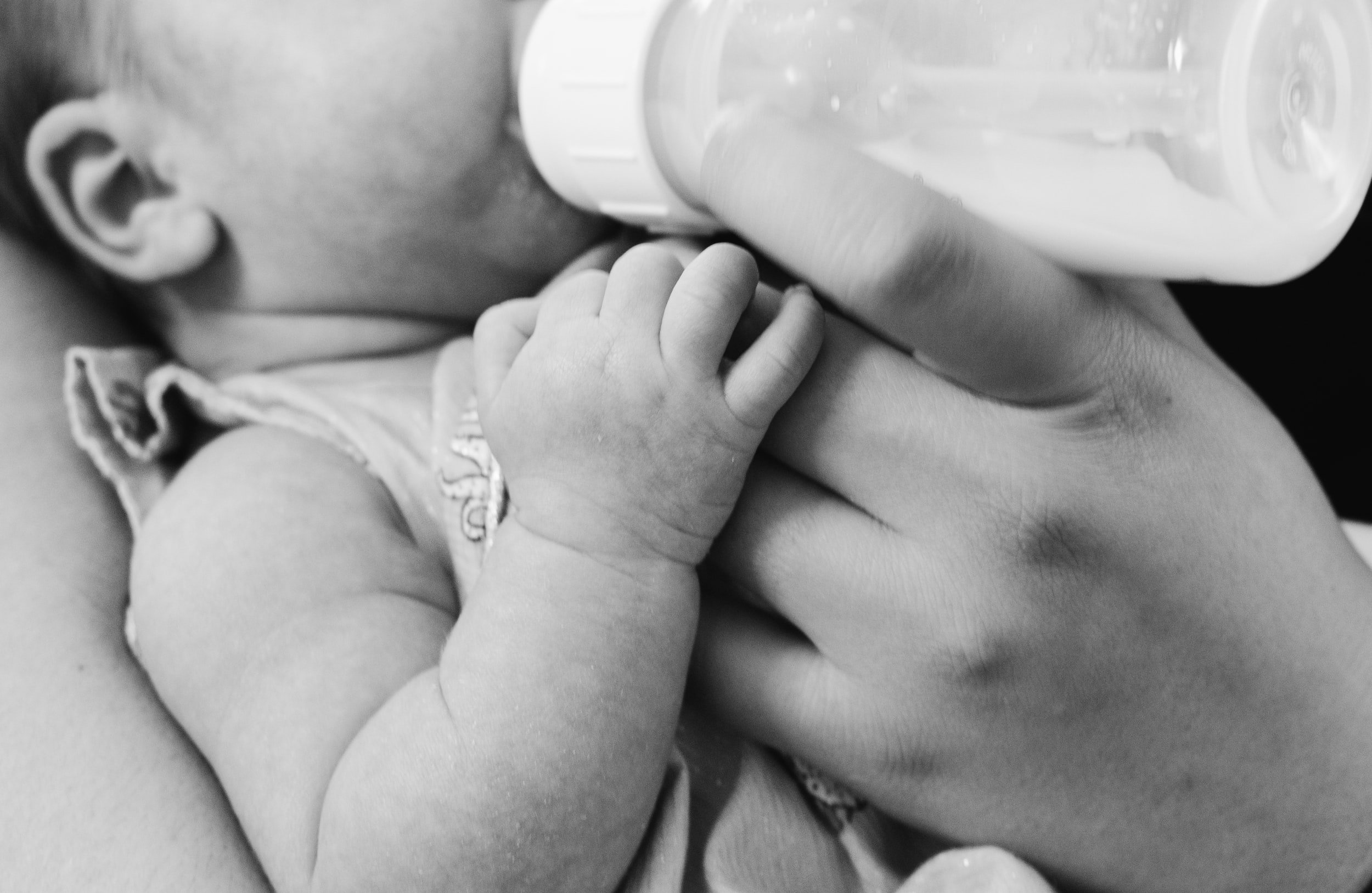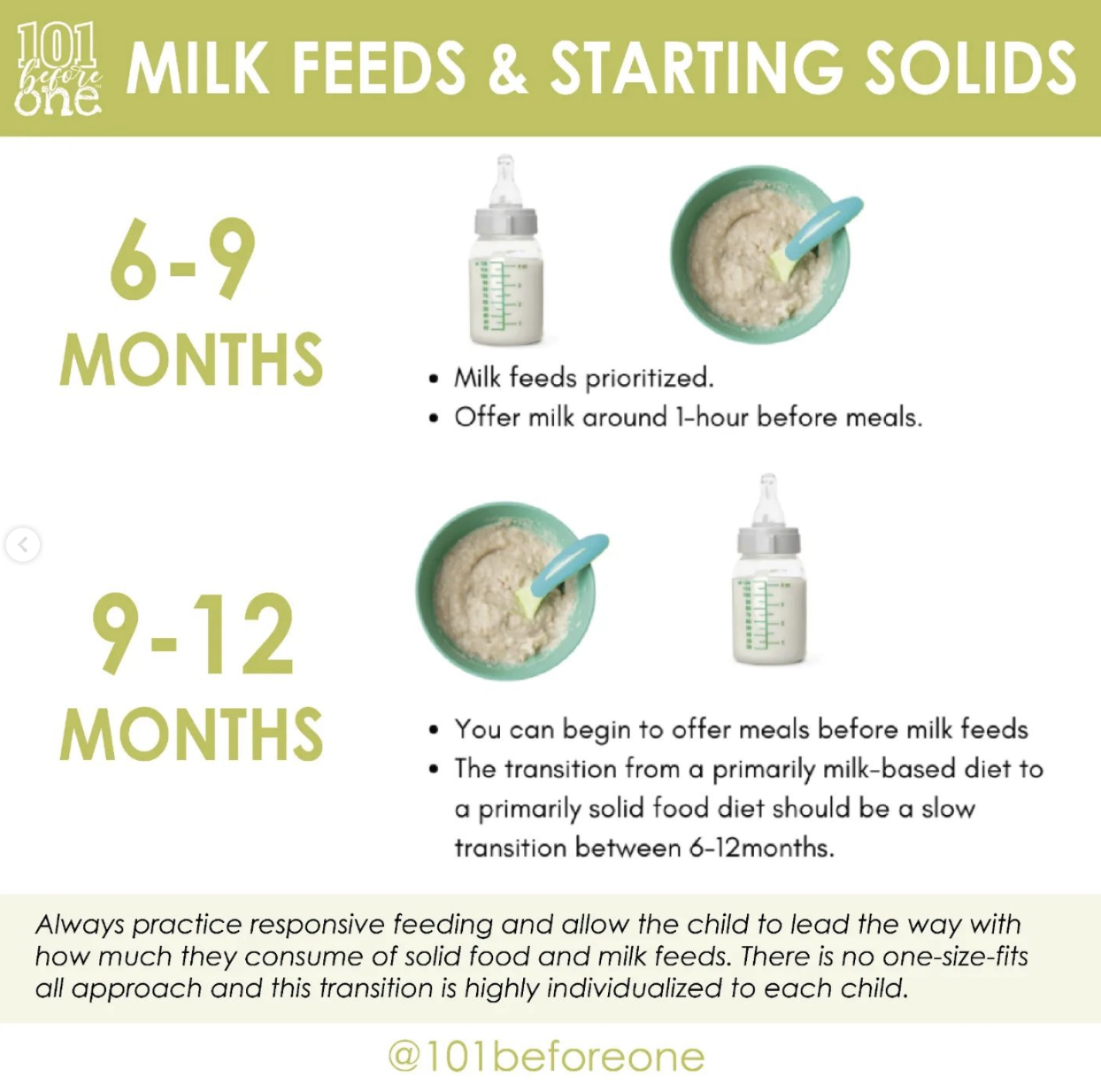How to balance milk feeds when starting solids
1/17/2023
Written by Cinthia Scott, RD, CLC, Registered Dietitian and Certified Lactation Counselor
As a parent, you likely have many questions around introducing solids to your infant. One question that we hear quite often is “How do I balance milk feeds now that I am starting solids?” There are many things to consider, including how many meals to serve, when to offer solids throughout the day, and how many milk feeds should baby have when starting solids. Today we’re answering all of these questions and more to help you navigate this time of transition for you and your baby.
What is the best age to start introducing solids to baby?
The current recommendation by many top organizations, including the American Academy of Pediatrics (AAP), is to start solids around 6 months of age when baby is showing signs of readiness. You’ll know baby is ready to start solids when they have good head and neck control, are able to sit upright with very minimal support, are bringing their hands and toys to mouth, and are chewing on teethers and other objects. Every baby is different in regards to developmental readiness for solids, which is why it’s important for parents to consider age and these signs of readiness.
How much milk should I feed my baby with solids?
When it comes to balancing solid food and milk-feeds, there are no set guidelines or exact science to this process. The main point to remember is that milk-feeds should be meeting most of an infant’s nutritional needs before the age of 12 months. The weaning process should be a slow transition from a primarily milk-based diet to a primarily solid-food diet.
This transition is highly individualized to each child and caregiver and the main point is to ensure that we are allowing the child to lead the way with the amount of milk and solid foods consumed, while also making sure to provide them with proper nutrition to ensure we are meeting their nutrient needs during this period of rapid growth.
Solids are classified as “complementary foods” before the age of 12 months because they are meant to complement milk-feeds and not to take precedence over, or replace them.
The AAP’s Healthy Children Project recommends continuing to provide milk feeds on demand if you are a nursing mother. They also mention that the number of nursing sessions will gradually decrease as solid food increases.
How long should you wait between milk and solids? Do you give solids straight after milk?
In general, for a 6-9 month we recommend offering milk feeds at least an hour before meals and then for a 9-12 month old we recommend making the transition to start offering solid foods before milk feeds.
How much solid food should my baby be eating?
During the first few weeks of introducing complementary foods, some children may not eat much and that is okay. Once you realize how much of a learning process this is for the child, we realize that we need to give them time and space to learn and develop! We want to focus on practicing responsive feeding practices and allowing the child to lead the way with how much or how little solid food they consume.
In most cases we do not need to worry if the child is eating enough during this period if they are offering frequent exposures to nutrient dense foods. Reminder; solid foods are not as nutrient dense when compared to formula or breast milk, so don’t be surprised if you do not notice a decline in milk-feeds for several months, or even up to 12 months.
Another key point to remember is babies have small stomachs requiring them to eat small amounts often throughout the day. This means we do not need to stress about feeding our child large portions or be concerned if they only consume small amounts of food at mealtimes. Babies of the same age, weight, and activity level may eat very different amounts of solid foods. Don't compare your baby to another baby.
What time of the day is best to feed baby solids?
When you first start solids with your baby around 6 months of age, you only need to offer 1 meal per day. This can be at any time throughout the day that works best for you and your baby, either breakfast, lunch or dinner. We encourage you to eat alongside your baby and share family meals, so ideally this would be a time you are also sitting down to eat. If introducing the Top 9 allergenic foods, we recommend serving those to baby in the morning so that you can more easily monitor any signs of an allergic reaction.
How many times a day can I feed my baby solids?
We’ve put together a FREE quick reference guide to help you understand how to move from just one meal a day at 6 months to several meals and snacks by 12 months.
DOWNLOAD FREE MEAL MILESTONES GUIDE HERE>
Next, we’ll walk through how many meals to feed your baby with baby-led weaning from 6 months to 12 months. This information is also inside our Printed Book & Digital App for our 101 families to reference.
Excerpt from our Printed Book >
Key milestones for solids and milk feeds at 6 months:
-Start with 1, possibly 2 meals per day
-Provide breastmilk and/or formula one hour before mealtimes to ensure your baby has an appetite, but is not overly hungry.
–Choose times to provide meals when you can give your full attention to your baby so that he or she has plenty of time to eat without being rushed, and messes can be made.
-Offer small amounts of water in an open cup, or straw cup. Your child may not successfully manage to drink out of the cup, but this is a good opportunity to practice. (We have instructions on how to do this inside our Baby-led Feeding 101 Course)
-Consider introducing top food allergens, as directed by pediatrician. (We have detailed instructions on introducing allergens inside our program.)
Key milestones for solids and milk feeds at 7-8 months:
Transition to 3 meals per day (Such as Breakfast, Lunch, and Dinner)
-Continue to provide breastmilk and/or formula an hour before meals.
-Offer the top allergen foods, as well as foods with a variety of tastes, flavors, and textures. Aim to offer the top allergens at least three times per week and continue this throughout the first year of life and beyond. (Be sure to avoid any known allergens.)
Key milestones for solids and milk feeds at 9-10 months:
3 meals per day plus 1 snack (Snack should be offered between lunch and dinner)
-Your baby should work on feeding themselves the majority of the meal.
-Keep working on drinking out of an open cup and/or straw cup.
-At this point it is best to only offer naturally occurring purées, such as applesauce and yogurt.
-Keep the breastmilk and/or formula flowing! You can give food before milk, but do not decrease the frequency or volume of the milk unless your baby is naturally drinking less. If you are worried about your child’s milk intake, talk to your pediatrician.
Key milestones for solids and milk feeds at 11-12 months:
3 meals per day plus up to 3 snacks (Let your baby lead the way; the number of snacks will vary by child.)
-You might notice your baby consuming less breastmilk and/or formula during this time because solid foods may start to take over as the main nutrition source. However, if your baby still prefers breastmilk and/or formula at this stage, that is perfectly fine.
-Top allergen foods should have been introduced and be a consistent part of the diet by now. (Be sure to avoid any known allergens.)
-Your baby should be self-feeding and/or working on using utensils designed for infants, as well as practicing with open and straw cups.
-Try to eat as a family for as many meals as possible. Your baby should play an active part in family mealtimes. He or she will love it!
Summary
It is important to note that although you now offer meals, that does not mean that your baby will eat every time – and that is OK! As long as you follow your baby’s lead and continue to offer solids, he or she will catch on. If you have any concerns, talk to your pediatrician. Use these schedules as a starting place and adapt based on your child.
Ready to learn more about starting solids?
If you found this post helpful, we share more evidence-based best practices for starting solids inside our 101 before one program.
At 101 before one, we believe babies who eat Family Meals from the Start™ will be happy, healthy eaters for life. Starting solids can be intimidating, but we show you how to introduce 101 different foods to your baby before their first birthday, all through simple, easy-to-follow recipes that the whole family can enjoy.




